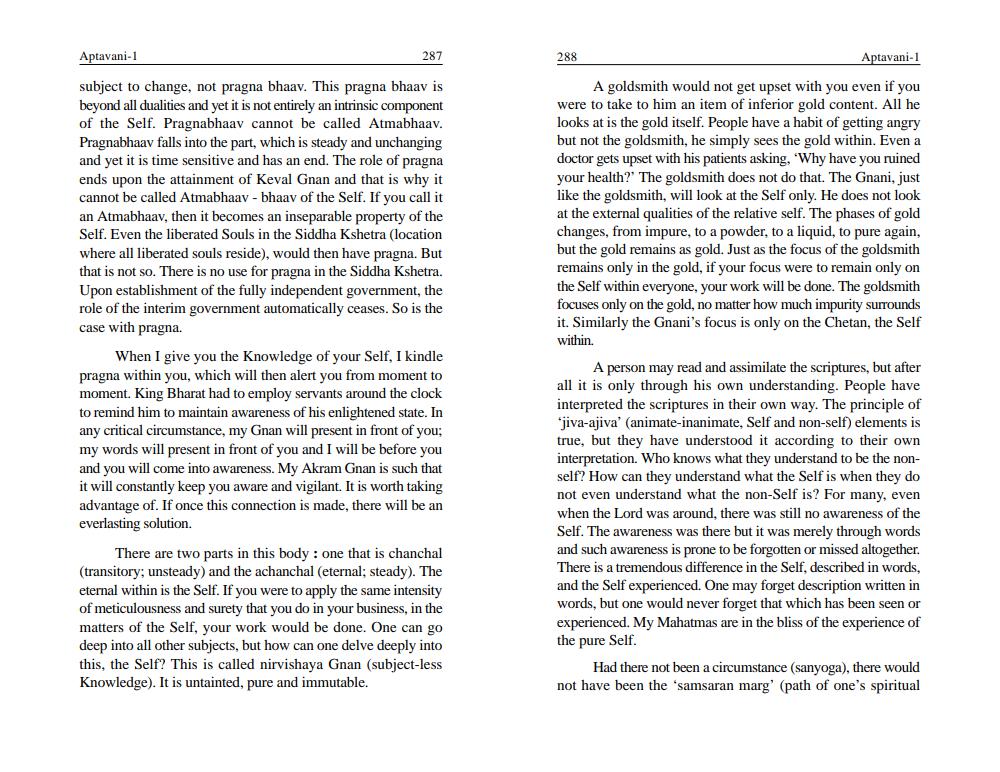________________
Aptavani-1
287
288
Aptavani-1
subject to change, not pragna bhaav. This pragna bhaav is beyond all dualities and yet it is not entirely an intrinsic component of the Self. Pragnabhaav cannot be called Atmabhaav. Pragnabhaav falls into the part, which is steady and unchanging and yet it is time sensitive and has an end. The role of pragna ends upon the attainment of Keval Gnan and that is why it cannot be called Atmabhaav - bhaav of the Self. If you call it an Atmabhaav, then it becomes an inseparable property of the Self. Even the liberated Souls in the Siddha Kshetra (location where all liberated souls reside), would then have pragna. But that is not so. There is no use for pragna in the Siddha Kshetra. Upon establishment of the fully independent government, the role of the interim government automatically ceases. So is the case with pragna.
When I give you the knowledge of your Self, I kindle pragna within you, which will then alert you from moment to moment. King Bharat had to employ servants around the clock to remind him to maintain awareness of his enlightened state. In any critical circumstance, my Gnan will present in front of you; my words will present in front of you and I will be before you and you will come into awareness. My Akram Gnan is such that it will constantly keep you aware and vigilant. It is worth taking advantage of. If once this connection is made, there will be an everlasting solution.
There are two parts in this body: one that is chanchal (transitory; unsteady) and the achanchal (eternal; steady). The eternal within is the Self. If you were to apply the same intensity of meticulousness and surety that you do in your business, in the matters of the Self, your work would be done. One can go deep into all other subjects, but how can one delve deeply into this, the Self? This is called nirvishaya Gnan (subject-less Knowledge). It is untainted, pure and immutable.
A goldsmith would not get upset with you even if you were to take to him an item of inferior gold content. All he looks at is the gold itself. People have a habit of getting angry but not the goldsmith, he simply sees the gold within. Even a doctor gets upset with his patients asking, 'Why have you ruined your health?' The goldsmith does not do that. The Gnani, just like the goldsmith, will look at the Self only. He does not look at the external qualities of the relative self. The phases of gold changes, from impure, to a powder, to a liquid, to pure again, but the gold remains as gold. Just as the focus of the goldsmith remains only in the gold, if your focus were to remain only on the Self within everyone, your work will be done. The goldsmith focuses only on the gold, no matter how much impurity surrounds it. Similarly the Gnani's focus is only on the Chetan, the Self within.
A person may read and assimilate the scriptures, but after all it is only through his own understanding. People have interpreted the scriptures in their own way. The principle of 'jiva-ajiva' (animate-inanimate, Self and non-self) elements is true, but they have understood it according to their own interpretation. Who knows what they understand to be the nonself? How can they understand what the Self is when they do not even understand what the non-Self is? For many, even when the Lord was around, there was still no awareness of the Self. The awareness was there but it was merely through words and such awareness is prone to be forgotten or missed altogether. There is a tremendous difference in the Self, described in words, and the Self experienced. One may forget description written in words, but one would never forget that which has been seen or experienced. My Mahatmas are in the bliss of the experience of the pure Self.
Had there not been a circumstance (sanyoga), there would not have been the 'samsaran marg' (path of one's spiritual




